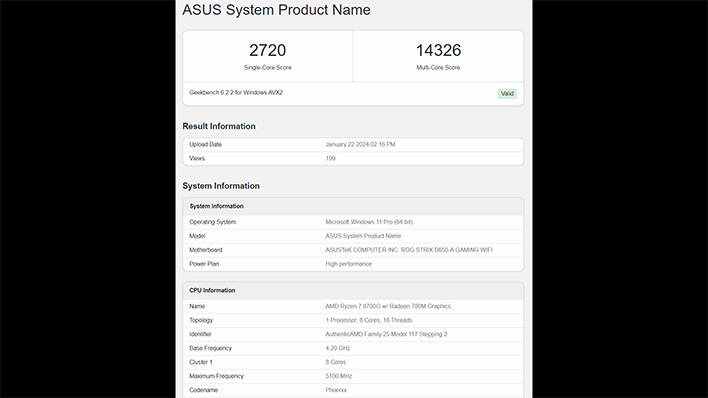AMD Ryzen 7 8700G, Ryzen 5 8600G Benchmarks Break Cover For A Performance Preview
The Ryzen 7 8700G scored 2,720 points in Geekbench 6.2.2’s single-core benchmark, and 14,326 points in Geekbench 6.2.2’s multi-core benchmark. The Ryzen 5 8600G, scored 2,474 points in the same single-core test and 11,453 points in the same multi-core test. Compared to the 8700G’s closest rival in AMD’s existing desktop lineup, the Ryzen 7 7700, the 8700G was 4.6% slower in the single-core benchmark and just 2.6% slower in the multi-core test.
| CPU |
Single-Core |
Multi-Core |
| Ryzen 7 8700G |
2,720 | 14,326 |
| Ryzen 7 7700 |
2,845 | 14,682 |
| Ryzen 5 8600G |
2,474 | 11,453 |
| Ryzen 5 7600 |
2,734 | 12,238 |
Cache capacity is also lower in the Ryzen 8000 series, going from 32MB on Ryzen 7000 non-X3D parts down to just 16MB, similar to prior generations. But, Geekbench 6.2.2 is not really sensitive to the lower cache capacity. Either way, Geekbench is but one test. In addition, we also don’t know what memory speed the Ryzen 7 7700 and Ryzen 5 7600 CPUs were using. As such, take these results with a grain of salt.
That said Geekbench’s results do closely match what we would expect from the 8700G and 8600G’s hardware specifications. Depending on pricing, the Ryzen 7 8700G and Ryzen 5 8600G could end up outperforming AMD’s 65W Zen 4 parts in the DIY market. With the addition of a high-performance iGPU and NPU, if they are priced similarly to the Ryzen 7 7700 and Ryzen 5 7600, respectively, they'll be attactive parts for more mainstream builds. But we will have to wait to see where street pricing lands after the chips are released before we can make any determinations.


